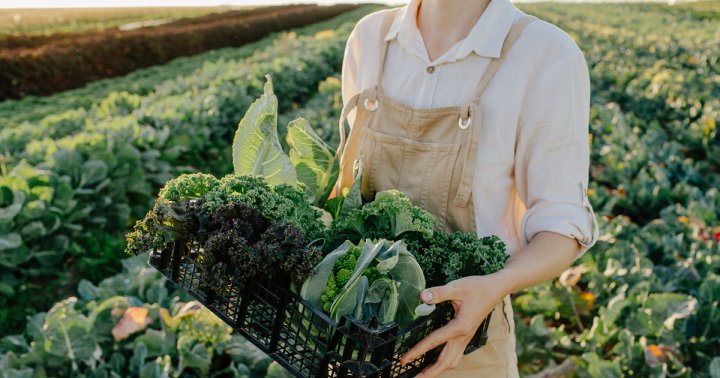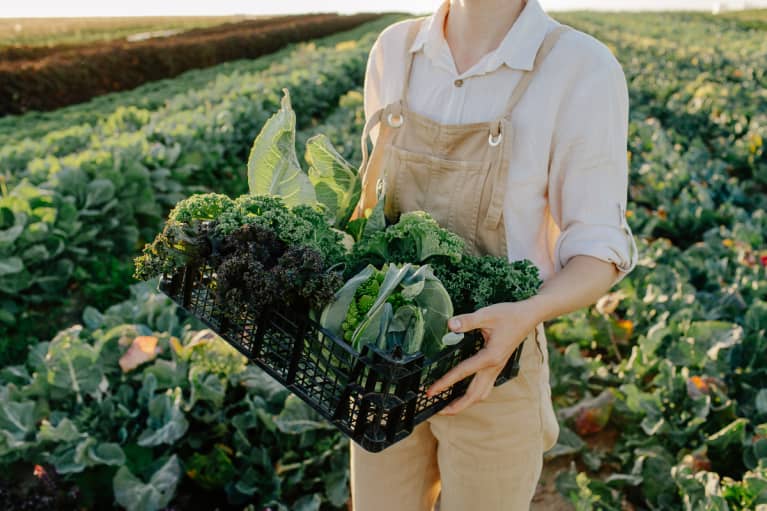This Dramatically Increases The Nutrient Density Of Your Food, Study Says
Proof that sustainable agriculture really is better for you and the planet!


March 26, 2022 — 10:34 AM
Unlike environmentally damaging growing practices used by commercial farms, regenerative agriculture improves the sustainability of the land to ensure farming can continue for years to come. Additionally, many have theorized that regenerative farming significantly increases the quality of food, but not much evidence has been available to support this theory—that is, until a nationwide study on regenerative farms was recently published in PeerJ.
What is regenerative agriculture?
Regenerative agriculture (aka regenerative farming) is a holistic, sustainable approach to farming that aims to restore the nutrient content of the soil with conservation and rehabilitation measures.
Regenerative farming operates on five principles:
By implementing systems to promote soil resilience, integrity, and well-being, regenerative farmers are supporting the environment, ecosystem, and their local communities with the food they produce or raise. (Learn how we can do our part to support regenerative farmers here.)
4 ways this study showed regenerative farming produces more nutritious food.
While the regenerative agriculture movement is certainly gaining traction, researchers haven’t been able to quantify the positive outcomes from implementing these sustainable, soil-enriching practices until now.
The PeerJ study compared the soil health and nutrient density of crops at regenerative and conventional farms in eight different states across the country. Each regenerative farm was paired with a conventionally-managed farm close by.
Both grew the same type of crop in the same kind of soil, then sent their crops to the Linus Pauling Institute at Oregon State University to be evaluated for B vitamins (specifically, thiamin, riboflavin, niacin, pantothenic acid, and B6), plus vitamins C, E, and K, as well as a slew of minerals (including magnesium, iron, sodium, phosphorous, calcium, copper, and zinc) and phytochemicals (i.e., total phenols, total phytosterols, and total carotenoids).
Here’s what the study found:
This groundbreaking study confirms what we at mbg have known all along to be true: regenerative farming is better for the environment and our health. While the type and quantity of nutrients varied by crop and farm, the nutritional value of crops produced with regenerative practices were profoundly higher than those farmed conventionally.
It’s also worth noting that the soil health significantly impacted the phytochemical levels of the produce. Healthier soil resulted in dramatically higher phytochemical content, which positively impacts our nutrition by promoting immune health and longevity. While the research in this field is ongoing, the evidence shown in this preliminary study indicates that regenerative agriculture has the potential to restore the nutritional quality of our food if implemented properly.
Until more farms are operating sustainably and regeneratively grown food becomes widely accessible, it’s important to make sure you’re getting the essential nutrients you need (and may not be getting as easily from your food, thanks to conventional farming). Consider adding a comprehensive, high-potency multivitamin (that also features an array of phytonutrients) like mbg’s ultimate multivitamin+ to your daily routine to ensure your dietary needs are met, no matter where your food is coming from.*
If you are pregnant, breastfeeding, or taking medications, consult with your doctor before starting a supplement routine. It is always optimal to consult with a health care provider when considering what supplements are right for you.
https://www.mindbodygreen.com/articles/regenerative-farms-boast-more-nutritious-crops-healthier-soil

 JaneWalter
JaneWalter 































